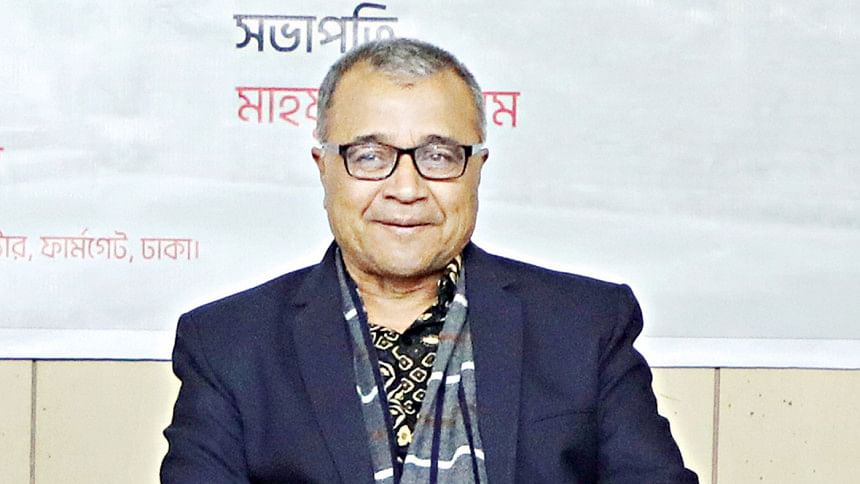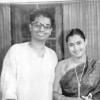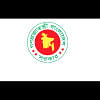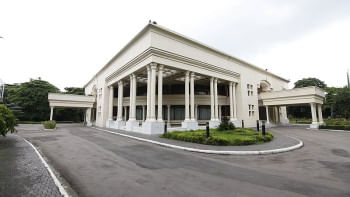Intellectuals failed to organise consent for a democratic republic

Salimullah Khan yesterday said the task of intellectuals is to realise consent for the state. They constitute the civil society while the organ functioning as political society realises coercion.
"Intellectuals constitute civil society, which is another name for ideological state apparatuses. In Bangladesh, intellectuals failed to produce that consensus or that ideological persuasion in favour of the ruling class ever since gaining independence as a sovereign republic," he added.
"What I'm trying to point out is the two pillars on which the edifice of the state stands are civil society and political society -- one being the pillar of consent and the other of coercion. When a state runs on the basis of consent, it constitutes a republic, a democratic state."
He observed that a state cannot run solely on coercion. It needs to operate on public consent, especially if it claims to be a democratic republic. Intellectuals are a vital cog in this process; they enable the state to function based on public consent.
Khan, a professor of General Education Program at the University of Liberal Arts Bangladesh, was speaking at a discussion titled "the role of intellectuals in reforming the state".
The Daily Star organised the discussion to mark the Martyred Intellectuals' Day, and also as part of storytelling sessions on the sidelines of an exhibition titled "36 Days of July -- Saluting the Bravehearts" at The Daily Star Centre in the capital.
Salimullah Khan, a leading academic of the country, said the history of the last 53 years in Bangladesh is a history of the "failure of intellectuals to organise consent of the ruled for the ruling class, and that is what made an event like the July-August revolution not only likely but real.
"Therefore, as the old generation of intellectuals failed them, the new generation of students had perforce to lead an upsurge as harbingers of a new generation of organic intellectuals."
Khan said the Pakistanis killed intellectuals just ahead of Bangladesh's victory as they understood they (intellectuals) had made people conscious about the neocolonial rule of the Pakistanis during the independence struggle.
He described a section of intellectuals as "traditional" ones who are conservatives, if not outright reactionaries ... who comprised barricades to new sensibilities and thoughts, and then he invoked another group, i.e. the "organic" ones who wanted change especially in the face of a desire to establish justice in society. "Desire," Khan said, "is metonymy whereas deception is a symptom, that is to say metaphor."
Talking about the recent mass upsurge, he said it has created hope among many, as many of the organisers of the uprising are young and organic intellectuals with foresight.
"Our society is not infertile. No one knew from where these leaders would emerge. Whether they will survive or not, I can't really say anything as a fortune-teller."
He said that old leaderships are failing to understand that they are on the verge of the end of their political career. The old is dying but the new cannot be born. In the interregnum, a whole set of morbid symptoms appear.
He said that a section of teachers worship some people for personal and professional benefits.
"University teachers have destroyed universities for a plot of land or for a steady job for a relative or even to secure a transfer from one place to another. They have destroyed institutions for getting own benefits."
Talking about the education system, Khan said medium of classroom instructions at general schools, madrasas and others should be the mother tongue, and a foreign language must not supplant it.
He said that someone can learn different languages but that should not be in place of Bangla, and that the present system of "Englishing" Bangladesh is just "killing Bangla" as a culture and as an identity marker.
"If you want to make the education generally available, there is no alternative to having education in the natural language of the student populace."
Journalist and writer Kajal Rashid Shahin said that during the independence struggle and Liberation War, intellectuals played a glorious role. He said it is important to know the roles of the architects of the nation and reforms should be carried out in line with their thoughts.
Government Titumir College Vice-Principal and writer Prof Mizanur Rahman said there should be a process to groom intellectuals and there should be discussions about their role in nation-building.
The Daily Star editor and publisher Mahfuz Anam moderated the programme.

 For all latest news, follow The Daily Star's Google News channel.
For all latest news, follow The Daily Star's Google News channel. 








Comments